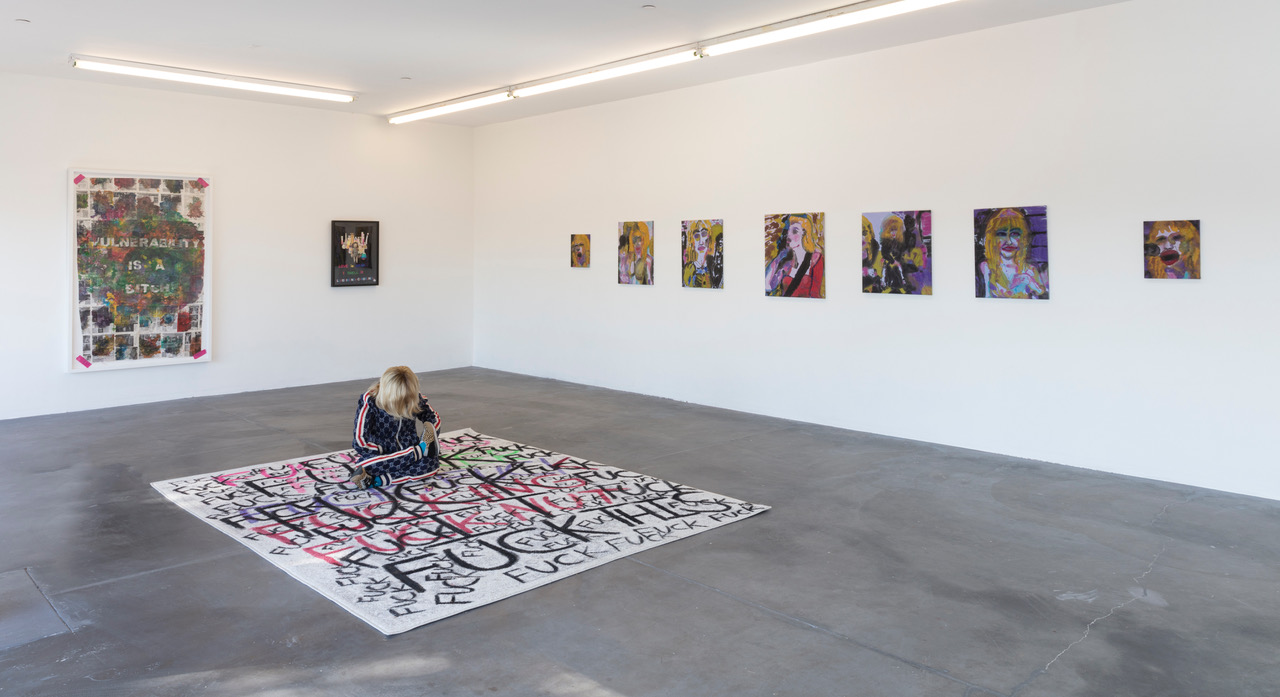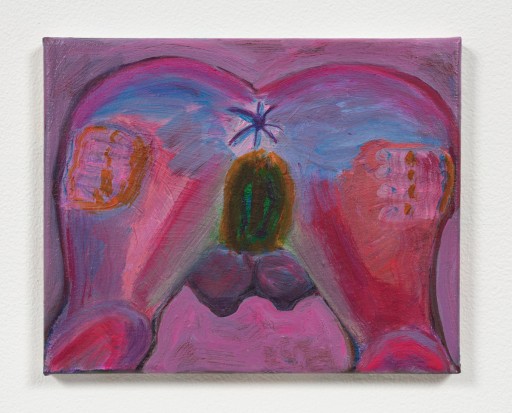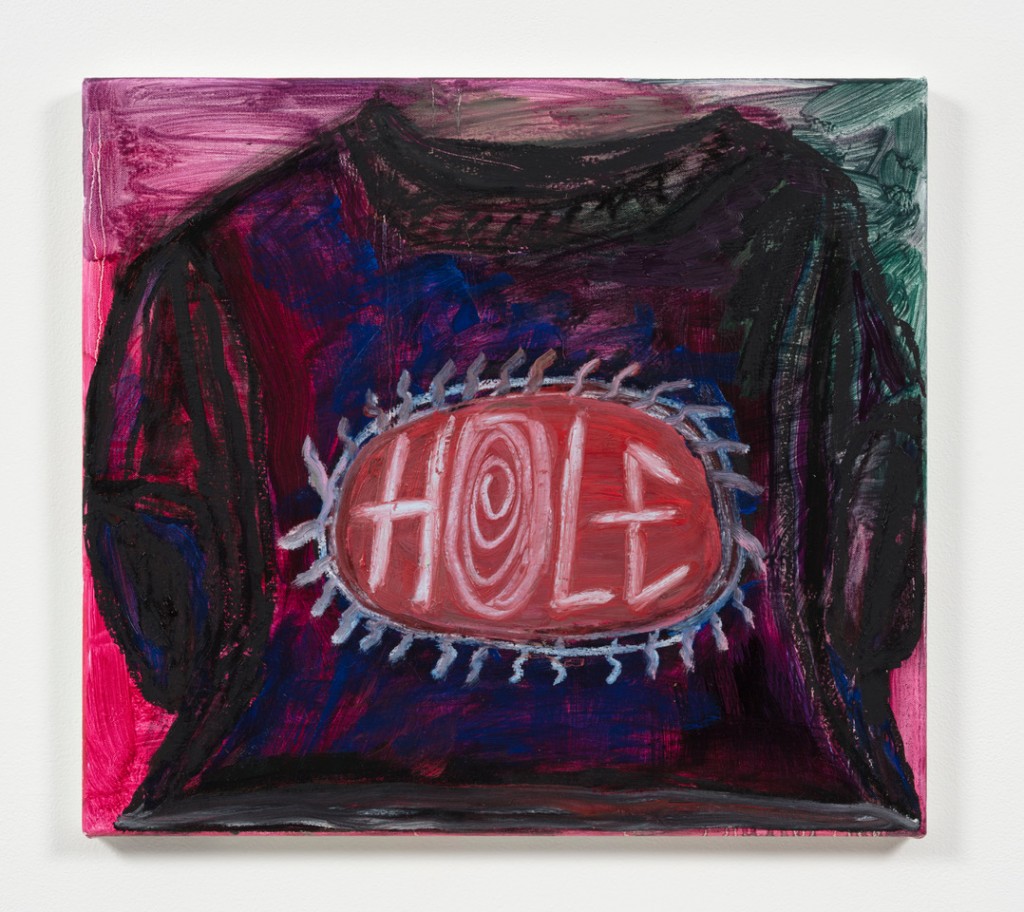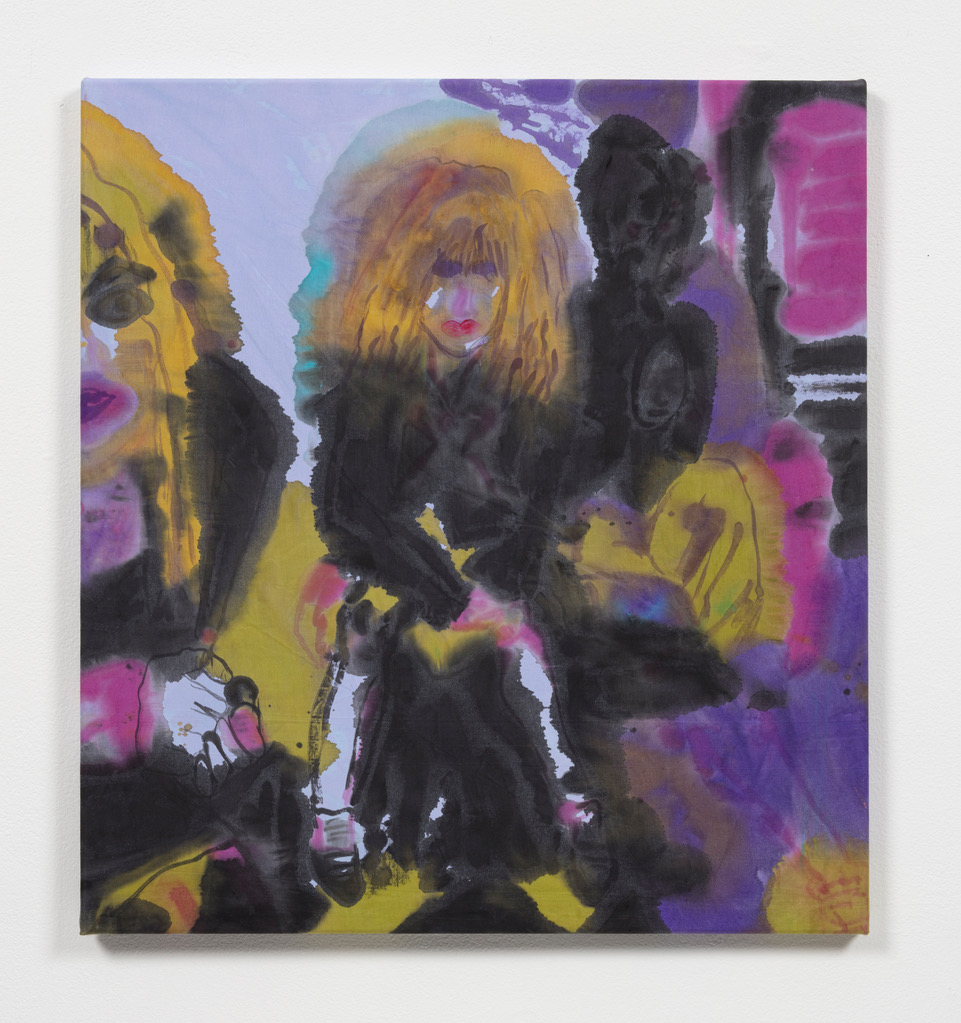Group Show
Female SensibilityLos Angeles | January 11 - March 1 2020
Artists: Kirsten Stoltmann, Jennifer Sullivan
Press: Artillery

”Female Sensibility“ is a two person show with LA based artist Kirsten Stoltmann and NY based artist Jennifer Sullivan. The title for the exhibition is inspired by Lynda Benglis’s 1973 video Female Sensibility which simultaneously acknowledges and parodies ideas around being categorized as a woman artist or defined artistically through gender. Stoltmann and Sullivan have continued aspects of this strategy in their own work through fore-fronting not just the female body and gaze, but their own specific bodies, emotional lives, and experiences, in favor of exploring the layers of meaning around self-representation and gender identity. In their work, there is a both a revised valuation of characteristics often assigned as feminine such as emotion, intuition, sensuality, and relationships, as well as a resistance and subversive attitude towards the limiting roles that women are expected to fulfill.

The following is an excerpt from an interview the artists conducted with each other in preparation for the exhibition.
Jennifer: Something I've always admired about your work was its fearless ability to express a feminine anger. I think women can be very dis-empowered by the societal messages they get that it's not OK to be angry, and that being angry can get you labeled as a bitch.
Kirsten: Trust me, I am labeled as a bitch, mean and difficult to work with. That's called gaslighting!!!!! It's ridiculous how people justify not giving you the credit and props you deserve. I am angry, thank God! If I wasn't angry there would be no point in going on. Anger is a great motivator to make work. I believe in mindfulness and positive thinking as well but being angry is an important motivator to get things done quicker.
Jennifer: I'm reminded of this Lawrence Weiner quote that has always stuck with me: "All art is made from anger." How do you feel about that idea? I'm curious if this came naturally to you or if it was something you learned how to harness through your work?
Kirsten: Anger comes naturally. I was raised by angry parents. I had to unlearn anger. I am now harnessing it in a more positive way. You should never ignore anger. Anger can be really funny, and I embrace that.
Jennifer: I feel like we have this shared lexicon of using pop stars and music as a visual language. Kirsten: I have always been influenced by music when making a piece. Music, usually a live show, inspires me to make work. I used to make music videos of me being cool, which is so uncool. I loved the feelings that would come up with certain songs, pure exhilaration, nostalgia, sadness, anger, you name it, certain music could call all those feelings up. I want to do that!
Jennifer: How did you begin using images of people like Mariah and Toni Braxton in your work? When I first started using pictures of Mariah it was more for her fashion picks, I thought she was pretty tacky. When I brought her back out in 2018/19 a lot had changed for her and me. She recently started talking about her bi-polar diagnosis and started to become a lot more vulnerable in her interviews. She had been through a lot of shit, I felt for her She opened up and it opened up a lot of possibilities for me to put my feelings into her voice. Which I did, I ranted through her to heal my own past discrepancies and ill treatment by others that felt relatable to her.
Kirsten: Ok so, I love this series of Courtney Love paintings you are working on. What motivated you and was it an obsession?
Jennifer: I can be fairly obsessive, yeah. I don’t know if my interest in Courtney Love is an obsession or just a fascination though. She’s such a multifaceted character, a strong female lead, if you will and I see this work as a way of inhabiting her, like method acting. So, when I paint her, I am trying on the parts of her that I am trying to access or exorcize in myself. I think my biggest interest in her is her un-likeability, which seen another way could be called a sense of integrity and resistance, rather than being molded to be what was expected of her. Ironically, her resistance to being likeable makes me love her. And I think it’s interesting to compare how Kurt was heroicized for the same traits that she was villainized for – ambitious, no fucks given, addiction issues, moody, tortured artist, etc. Also, I am not really interested in her celebrity per se, but in the language of pop culture as a shared and accessible vocabulary. Her image and the narrative arcs of her career and very public personal life, invoke issues about ambition, motherhood, feminism, self-esteem, loss, anger, survival, and transformation. However, my intention for this work is that it will communicate on an emotional level whether you are familiar with Love or not.
Kirsten: I like the realness and rawness of your paintings, unpretentious, uncool but cool, vulnerable and funny. They are refreshing and unabashedly nerdy and real but incredibly painterly. Can you tell I don't know what the fuck I am talking about, but I sincerely mean what I am trying to say. I don't know anything about painting, but I relate to yours because they are honest and earnest. No question just my opinion.
Kirsten: When did you discover you were an artist? When were you comfortable identifying as one? Jen: I’ve always known myself to be an artist, I remember saying this when I was 5 years old, and I knew from a young age that I planned to move to NYC to pursue being an artist and create some kind of bohemian lifestyle for myself. I never really knew where I got this idea until after my mom passed away though, and I realized that she had wanted to be an artist too. She had painted, and drew, and written poetry throughout my life, but I never understood that this was a deep longing of hers, which I had inherited, and which she didn’t really have the confidence or stability to really commit to because of her mental illness (she was bipolar). So it was a huge realization for me when I discovered this and it helped me to feel more connected to her, and to feel a sense of that I was making art not just for myself, but for her, and other women like her who had not really had a chance to share their voices. It gave me this new sense of meaning and drive.
So, while I’ve identified as an artist for most of my life on some level, I only recently realized that I’m not just an artist but a painter, and that has been a big shift for me. I can see now that I was intimidated to put myself fully into that arena for a long time because it felt like the eye of the hurricane in terms of art history, power, and all that, and I’ve only recently found the confidence to focus completely on painting and drawing.
Jennifer: Something I've always admired about your work was its fearless ability to express a feminine anger. I think women can be very dis-empowered by the societal messages they get that it's not OK to be angry, and that being angry can get you labeled as a bitch.
Kirsten: Trust me, I am labeled as a bitch, mean and difficult to work with. That's called gaslighting!!!!! It's ridiculous how people justify not giving you the credit and props you deserve. I am angry, thank God! If I wasn't angry there would be no point in going on. Anger is a great motivator to make work. I believe in mindfulness and positive thinking as well but being angry is an important motivator to get things done quicker.
Jennifer: I'm reminded of this Lawrence Weiner quote that has always stuck with me: "All art is made from anger." How do you feel about that idea? I'm curious if this came naturally to you or if it was something you learned how to harness through your work?
Kirsten: Anger comes naturally. I was raised by angry parents. I had to unlearn anger. I am now harnessing it in a more positive way. You should never ignore anger. Anger can be really funny, and I embrace that.
Jennifer: I feel like we have this shared lexicon of using pop stars and music as a visual language. Kirsten: I have always been influenced by music when making a piece. Music, usually a live show, inspires me to make work. I used to make music videos of me being cool, which is so uncool. I loved the feelings that would come up with certain songs, pure exhilaration, nostalgia, sadness, anger, you name it, certain music could call all those feelings up. I want to do that!
Jennifer: How did you begin using images of people like Mariah and Toni Braxton in your work? When I first started using pictures of Mariah it was more for her fashion picks, I thought she was pretty tacky. When I brought her back out in 2018/19 a lot had changed for her and me. She recently started talking about her bi-polar diagnosis and started to become a lot more vulnerable in her interviews. She had been through a lot of shit, I felt for her She opened up and it opened up a lot of possibilities for me to put my feelings into her voice. Which I did, I ranted through her to heal my own past discrepancies and ill treatment by others that felt relatable to her.
Kirsten: Ok so, I love this series of Courtney Love paintings you are working on. What motivated you and was it an obsession?
Jennifer: I can be fairly obsessive, yeah. I don’t know if my interest in Courtney Love is an obsession or just a fascination though. She’s such a multifaceted character, a strong female lead, if you will and I see this work as a way of inhabiting her, like method acting. So, when I paint her, I am trying on the parts of her that I am trying to access or exorcize in myself. I think my biggest interest in her is her un-likeability, which seen another way could be called a sense of integrity and resistance, rather than being molded to be what was expected of her. Ironically, her resistance to being likeable makes me love her. And I think it’s interesting to compare how Kurt was heroicized for the same traits that she was villainized for – ambitious, no fucks given, addiction issues, moody, tortured artist, etc. Also, I am not really interested in her celebrity per se, but in the language of pop culture as a shared and accessible vocabulary. Her image and the narrative arcs of her career and very public personal life, invoke issues about ambition, motherhood, feminism, self-esteem, loss, anger, survival, and transformation. However, my intention for this work is that it will communicate on an emotional level whether you are familiar with Love or not.
Kirsten: I like the realness and rawness of your paintings, unpretentious, uncool but cool, vulnerable and funny. They are refreshing and unabashedly nerdy and real but incredibly painterly. Can you tell I don't know what the fuck I am talking about, but I sincerely mean what I am trying to say. I don't know anything about painting, but I relate to yours because they are honest and earnest. No question just my opinion.
Kirsten: When did you discover you were an artist? When were you comfortable identifying as one? Jen: I’ve always known myself to be an artist, I remember saying this when I was 5 years old, and I knew from a young age that I planned to move to NYC to pursue being an artist and create some kind of bohemian lifestyle for myself. I never really knew where I got this idea until after my mom passed away though, and I realized that she had wanted to be an artist too. She had painted, and drew, and written poetry throughout my life, but I never understood that this was a deep longing of hers, which I had inherited, and which she didn’t really have the confidence or stability to really commit to because of her mental illness (she was bipolar). So it was a huge realization for me when I discovered this and it helped me to feel more connected to her, and to feel a sense of that I was making art not just for myself, but for her, and other women like her who had not really had a chance to share their voices. It gave me this new sense of meaning and drive.
So, while I’ve identified as an artist for most of my life on some level, I only recently realized that I’m not just an artist but a painter, and that has been a big shift for me. I can see now that I was intimidated to put myself fully into that arena for a long time because it felt like the eye of the hurricane in terms of art history, power, and all that, and I’ve only recently found the confidence to focus completely on painting and drawing.













